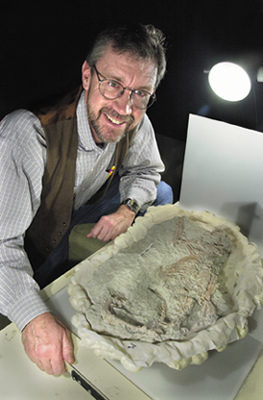 This month, the
Society of Vertebrate Paleontology (SVP) will recognize David Krause with the
2003 Joseph T. Gregory Award for outstanding service to the welfare of the organization.
But his activities in the paleontology community also have a global impact.
This month, the
Society of Vertebrate Paleontology (SVP) will recognize David Krause with the
2003 Joseph T. Gregory Award for outstanding service to the welfare of the organization.
But his activities in the paleontology community also have a global impact.Krause’s first fossil forays were at home on his family’s ranch in southeastern Alberta, Canada. “There’s not so much free time on a ranch,” Krause says. But as a boy, he managed to find some to search for fossils. Not until his first digs as a student at the University of Alberta did Krause truly realize the extent of his obsession. Searching for fossils “instantly clicked with me,” the 53-year-old researcher says. “I still find the excitement of discovering new fossils unparalleled.”
David Krause of Stony Brook University gets familiar with a fossil vertebrate specimen from the Late Cretaceous of Madagascar. Photo by John Griffin, Medical Photography, Stony Brook University.
Despite his preference for mammals, Krause tends to make finds that change the dinosaur landscape. His colleagues have named more than half a dozen new species after him (he’s lost track of the number he has named himself). However, Krause is perhaps better known for inspiring the name of meat-eating dinosaur Masiakasaurus knopfleri, after his favorite guitarist, Mark Knopfler, whose music often accompanies his digs.
Fieldwork remains of paramount importance to Krause, who, for most of his career, has taught and conducted research in paleontology at Stony Brook University in New York. Krause also has research responsibilities at the Field Museum of Natural History in Chicago, and he teaches human gross anatomy in Stony Brook University’s School of Medicine.
“Dave is an excellent teacher,” says Kristi Curry Rogers, one of his former graduate students, who is now curator of paleontology at the Science Museum of Minnesota in St. Paul. Curry Rogers was co-author on a paper published with Krause in the Apr. 3 Nature, documenting cannibalism among dinosaurs for the first time (Geotimes, June 2003). She had chosen him to serve on her doctoral thesis committee and spent several semesters as his teaching assistant. Krause, she says, is “the kind of teacher who doesn’t think that he knows everything — and thinks there’s always more to learn.”
Knowing how much is unknown led Krause to testify before the U.S. Congress while president of SVP, regarding the necessity of protecting fossils in the public domain. “A number of fossil dealers had put forward legislation that would open public lands to commercial exploitation of fossils,” he says, referring to the now-defunct Fossil Preservation Act of 1996. “Fossils should remain in the public domain,” Krause says, “not sold to the highest bidder,” nor lost to research in the depths of a private collection.
Krause has taken the idea that fossils belong to the public to his field sites in Madagascar. He started working there in 1993, soon after the country opened to Western researchers. “In places like Madagascar, so much is paleontologically and geologically virgin territory,” Krause says. And the rocks there have proven to be the home of several taxa of vertebrate animals that Krause says “almost defy the limits of the imagination,” pushing the bounds of anatomical variation and testing plate tectonic history of the supercontinent Gondwana.
The field agreements he has negotiated with Madagascar’s government allow Krause and his coworkers to take fossils from the island nation, carefully bundled and encased in plaster jackets, for preparation and study in the United States. Once the fossils are prepared, half must be returned to Madagascar for display. The rest will go to the Chicago Field Museum for further study and viewing by non-scientists.
Many of the fossils that Krause’s teams collect have already been seen by a very important group of non-scientists: When Krause first worked there, Malagasy children gathered around his fieldsites every day of the week. He learned that the local Malagasy people had no school, and that no one in the community could read or write. He immediately raised $500 from his field crew — enough to purchase the services of a teacher for one year.
Two years later, Krause had established the Madagascar Ankizy Fund (“Ankizy” is the Malagasy word for “children”). Proceeds from the foundation have supported construction of a school house in Berivotra. Plans for healthcare facilities and several more schools in other villages are in the works. Krause recruited the services of medical staff from Stony Brook University, including dentists, to come into the field with him to run temporary health clinics.
“We were always on the lookout for ways to repay the villagers for their many kindnesses,” Krause says, which ranged from permission to work on their lands to field assistance.
“He didn’t just plunder the place of its fossils; he showed a real concern for the people there,” says Hans Sues, current president of SVP and paleontologist at the Carnegie Museum of Natural History in Pittsburgh, Pa. Sues adds that Krause will be receiving SVP’s service award for his terms as editor of the Journal of Vertebrate Paleontology and president of the SVP, as well as his innovative fundraising and dynamism promoting the society’s work. Krause’s ability to take action, Sues says, has made him “a catalyst for positive changes” in SVP, as well as in the world.
Naomi Lubick

